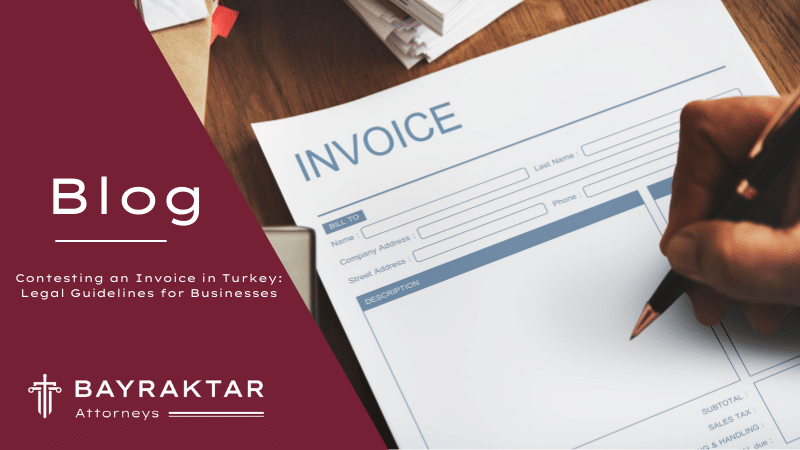
Contesting an Invoice in Turkey: Legal Guidelines for Businesses
Introduction: In Turkey, the consequences of being considered a trader under the Turkish Commercial Code are outlined, and one such consequence is specified in Article 21/2 of the TCC. According to this provision, if no objection is raised to the content of an invoice within 8 days from the date of receipt, the content of the invoice is deemed accepted. This presumption can be rebutted, but it holds significant legal weight.
How to Contest a Commercial Invoice: The Turkish Commercial Code does not provide explicit instructions on how to contest an invoice. Therefore, there is no rigid format for objecting to an invoice.
Methods for Objecting to an Invoice:
- Notarized objection letter
- Secure electronic signature
- Telegram
- Registered letter with acknowledgment of receipt
- By rejecting the invoice or returning it
It’s worth noting that verbal objections are also permissible if made within the 8-day timeframe. Additionally, filing a lawsuit within this period serves as evidence of objection.
Contesting an Invoice Under TCC Article 18/3: There is some debate in legal scholarship about how to contest an invoice under Article 18/3 of the TCC. According to Article 18/3, notifications or warnings related to defaulting, termination of contracts, or withdrawal from contracts among traders must be made through a notary, registered letter, telegram, or registered electronic mail system with a secure electronic signature.
Some scholars argue that when both parties are traders, one of these specified methods must be used to contest an invoice. Others believe that when neither party is a trader, the use of these specified methods is not mandatory.
The prevailing opinion, however, asserts that contesting an invoice is not subject to the special forms outlined in Article 18/3 since the law does not prescribe any specific form for contesting an invoice. Notably, according to jurisprudence, only traders are subject to the invoice objection procedure, and no such timeframe or requirement is imposed on consumers.
Consequences of Contesting an Invoice: If a recipient contests an invoice within the specified timeframe, the burden of proof shifts to the issuer of the invoice. The issuer must demonstrate that the invoice was prepared in accordance with the terms of the contract.
If the recipient contests the entire invoice amount, the original invoice should be returned to the sender. If only a portion is contested, payment for the uncontested part is still required to avoid incurring interest.
Consequences of Not Contesting an Invoice: Under TCC Article 21/2, failure to contest an invoice within the specified time frame implies acceptance of its content. However, for this presumption to apply:
- The issuer must be a trader conducting commercial activities, such as selling goods, providing services, or deriving benefits.
- Both parties (issuer and recipient) must be
It remains a subject of debate whether the recipient must also be a trader, with some scholars arguing that this requirement is not necessary. Nevertheless, the prevailing legal interpretation suggests that TCC Article 21/2 should primarily apply to traders, as supported by established court precedents. No specific time limit is imposed for consumers to contest an invoice.
Rights to Reject an Invoice: If a person receives an invoice that has been unfairly or unlawfully prepared, they have the right to reject it by contesting the invoice. The recipient must exercise this right within 8 days from the date of receiving the invoice.
Contesting an E-Invoice: Electronic invoices, both commercial (e-fatura) and basic (temel e-fatura), can be contested through the Revenue Administration’s Portal. For basic e-invoices, there is no “reject” button, so contestation can occur through the methods specified in Article 18/3 of the TCC, such as notary, registered letter, telegram, or secure electronic signature.
For commercial e-invoices, a “reject” button with a digital signature is available. Contestation can also occur through the methods mentioned above. The time limit for contesting e-invoices is 8 days from the date of receipt.
Conclusion: Contesting invoices in Turkey involves various legal nuances, especially when it comes to e- invoices. Understanding the procedures and obligations surrounding invoice contestation is crucial for both traders and consumers to protect their rights and interests. If you have any questions or require legal assistance in navigating these complexities, our firm, Bayraktar Attorneys, is here to provide expert guidance and support.







